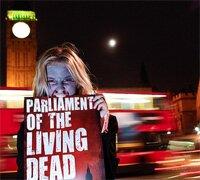Clegg and the Digital Revolution
At the Social Market Foundation on Wednesday, Liberal Democrat Leadership Candidate Nick Clegg began a speech by outlining the technological context of 21st Century politics. It is a good approximation of my own view. He said:
… the innovations and technological advances that are already shaping and defining the 21st century – Google, Wikipedia, Facebook, YouTube – are about something very different: they are about creating the tools that will enable people to deliver services to each other.
The old model was about constructing the institutional hardware of the paternalistic state. The new model is about developing the democratic software of the empowered society. The old model was controlled by a professional elite. The new model is operated by ordinary people.
…
This is the great paradox of our times: in our private and professional lives, we have never been more empowered.But in our relationship with the state, we have never been so powerless. And make no mistake; it is the poorest and the most vulnerable amongst us who lose out the most.
Mr Clegg’s campaign website has the full text (in which he goes onto propose that LEAs and PCTs be directly elected), and I’ve quoted the introduction at more length at my own place, if you’re interested.
Clegg is often viewed as being on the right of his party, but this introduction looks like a left-wing analysis to me. As I tried to articulate in Graachi’s post (which discussed What Blogging Can and Can’t Achieve), the attraction of blogging and the wider digital revolution, is in its potential to redress the power imbalance, leaking power from the elites to the masses. Does Clegg’s talk of “delivering services to each other” spring from the Right’s affection for the free market and the choices of individuals, or from the Left’s long held belief that we can achieve more through collective action, than we can alone? Given the free and social nature of blogging, YouTube and the political campaigns we see online, I’m inclined towards the latter view.
-------------------------
| Tweet |
Robert Sharp designed the Liberal Conspiracy site. He is the Campaigns Manager at English PEN, a blogger, and a director of digital design company Fifty Nine Productions. For more of this sort of thing, visit Rob's eponymous blog or follow him on Twitter @robertsharp59.
· Other posts by Robert Sharp
Filed under
Blog ,Lib-left future ,Libdems ,Our democracy ,Technology
6 responses in total ||
Robert
It is interesting to read your comments in light of yesterday’s report in the Observer http://www.guardian.co.uk/money/2007/dec/09/firsttimebuyers.property
What this example shows is, I fear, that far from the digital revolution ‘leaking power from the elite to the masses’ it will simply perpetuate division and accentuate differences. Cleggs talk of delivering services for each other (if the Facebook example is anything to go by) will not be about the strength and virtue of collective endeavour, it will be about looking after our own.
I think this is rubbish. Two of the four examples he gave are perfect examples of the relative disempowerment of individuals compared to the state and big corporations. Google and Facebook both collect disturbing amounts of information on the individual, which they use to build up a profile of you and sell that product to other companies. In the surveillance society, this huge inequality of information and (digital) power creates more social division rather than less – see the Information Commissioner’s report on the surveillance society (or my write up).
Wikipedia I would defend as being important, although Youtube much less so.
But anyway, this focus on these few well publicised examples misses out the enormous effort being spent on new technologies which are very much paternalistic: expansion of CCTV, development of biometric technologies, face recognition, etc.
First, I personally think that looking for signs of “right” or “left” in this speech/article/analysis is quite wrong and perpetuates an unhealthy obsession with such categories.
But never mind that, I still think that the challenges of the super-connected world are being grossly underestimated, even by Nick Clegg in this case. It has the potential to do away with currency as we know it for example. And to make it very difficult, for example, to trace incomes and wealth without even more intrusion into our private affairs than we allow at present.
I wrote the blog article that this comment links to eighteen months ago as a flavour of the sort of challenges these issues present and how we might get round them. But I do think Nick is correct in the sense that this is something completely new in the social delivery of services and goods. The big thing we need to be careful of is the infrastructure – if we are not careful we may all end up part of Verizon’s “Matrix” or whatever. Have a look at the idea of Market v3.0. Also the recent Royal Television Society lecture by Anthony Lilley highlighted how in “media” similar things are happening – no longer is “broadcast” a one-to-many paradigm, but a many-to-many possibility. James Murdoch, or the BBC, no longer have such control over what we read by way of news or opinion, or how we connect one to another.
This is the new media world in which the individual and the collective can meet up. I think you really need to be looking beyond notions of “right” and “left” in the various new marketplaces that will spring out of these developments. And think in terms of essentially “liberal” not right or left. And I suspect taht’s what Clegg was probably trying to get across.
I personally think that looking for signs of “right” or “left” in this speech/article/analysis is quite wrong and perpetuates an unhealthy obsession with such categories.
You may be right, Jock. I did try to be slightly equivocal in my post, above. But the issues of power and powerlessness should, I think, be at the forefront of our minds as these technologies are created, and used. Perhaps it is not so much that the new technology is inherently ‘Left’, but that those with Left wing values need pay attention, and help shape the technological development.
Absolutely we must help shape…
It’s all there to play for IMHO. It could be the great leveller – imagine trading direct with an individual African farmer say instead of having Nestle broker some mega-deal that rips us both off. Or it could be a ghastly Big Brother scenario – as Dan @ comment 2 seems to want to wish into inevitability!
Personally, I’m an optimist on this. There are enough clever people out here in internet land to subvert virtually anything the “state” or anyone else tries to fence us in with – Tim Berners-Lee would not have had it any other way.
As mentioned in that article I wrote 18 months or so ago, try having a look for work by a guy called Bernard Lietaer – his pet theory is of “Sustainable Abundance” built on the new markets made available to individuals by super-connectivity.
Can I point out that in the article’s abridged version – all that was needed was the term “post-bureaucratic age” and it could just have been a Cameron speech.
And is that sort of uniformity and lack of choice not the reason that people feel disempowered?
Reactions: Twitter, blogs
Sorry, the comment form is closed at this time.
You can read articles through the front page, via Twitter or RSS feed.
» John Pilger shames himself by attacking feminists over Julian Assange
» Why Labour was right to reject Bob’s drug policy
» Ten myths about housing benefit reforms in London
» What if Superdrug lived up to its name?
» Why we want to ‘recall’ Aaron Porter as NUS President
» Breakthrough in drugs debate as MPs call for full decriminalisation
» Report shows how the promise on NHS spending has been broken
» Why climate talks in Cancun failed miserably
» Why cuts to local councils will be much worse than Tories suggest
» Left unity and the bid to oust Aaron Porter
» The true horror of NHS privatisation is slowly coming out
|
4 Comments 29 Comments 15 Comments 4 Comments 15 Comments 47 Comments 39 Comments 34 Comments 19 Comments 33 Comments |
LATEST COMMENTS » cim posted on I know how let down Libdems must feel » Derek Bryant posted on 49 universities are or were under occupation » TeresaMary posted on 49 universities are or were under occupation » sunny hundal posted on 49 universities are or were under occupation » Roxanne Ellis posted on Andy B: MPs should have just one vote » Roxanne Ellis posted on Andy B: MPs should have just one vote » Liberal Conspiracy posted on Andy B: MPs should have just one vote » Liberal Conspiracy posted on Andy B: MPs should have just one vote » Planeshift posted on Ten myths about housing benefit reforms in London » Matt Munro posted on Ten myths about housing benefit reforms in London » Tax The Fat Cats posted on More Vodafone and Topshop protests coming » the a&e charge nurse posted on John Pilger shames himself by attacking feminists over Julian Assange » Sunny Hundal posted on I know how let down Libdems must feel » Sunny Hundal posted on John Pilger shames himself by attacking feminists over Julian Assange » Stuart White posted on I know how let down Libdems must feel |















